

The emotional and physical strain of caring for another may cause stress and affect a caregiver’s well-being and health (Jurong Health, 2015)
Thus, this resource center is set up to help adult caregivers understand the kinds of stress they face and learn on ways to cope with their caregiver stress and prevent caregiver burnout.
Overview. Do You Understand Caregiver Stress? - The Care Issue. When given the role of a caregiver, life takes a sharp turn, and all of a sudden, your life becomes that of another.
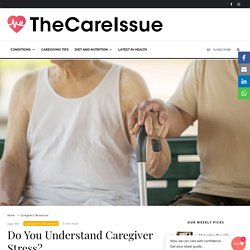
The allowance of time given to adapt is, at best, meagre; much less the time you have to wrap up the unfinished chapter of your life, leading to caregiver stress. When one falls ill and their condition does not go back to their original state of health, a caregiver is needed in their life. This responsibility usually falls onto family members. In Singapore, majority of the caregivers are the patient’s daughter or son. If the medical condition of their loved one improves with time, the caregiver is able to recover from the stress after they have tide through the tough time. Chronic stress is the most likely cause of caregiver burnout.
Academic Studies On Caregiver Stress. Overview. More S'poreans urged to learn caregiver skills, Singapore News. MORE than 20,000 people have made use of the Caregivers Training Grant since it was set up eight years ago to help them take care of loved ones.
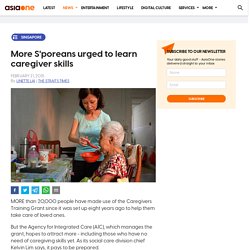
But the Agency for Integrated Care (AIC), which manages the grant, hopes to attract more - including those who have no need of caregiving skills yet. As its social care division chief Kelvin Lim says, it pays to be prepared. "At some point, elderly parents will need a caregiver. Having to pick up these skills when you have a lot of other things to worry about can be very tiring," he said. "The main benefit is the sense of assurance and reduced stress when an incident does occur.
" Those who apply for the grant get a $200 subsidy every year to take up a training course. Just seven course providers were listed when the grant was launched; now there are about 50. One repeat customer is 53-year-old James Teo, who started attending dementia care courses in 2009 to help him better understand his elderly mother. Linettel@sph.com.sg. Study on caregivers and the support they need, Singapore News. Retiree Elvin Tan used to care for his late mother who had dementia.
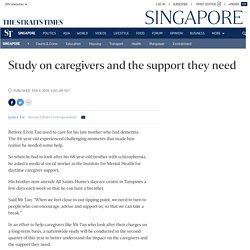
The 54-year-old experienced challenging moments that made him realise he needed some help. So when he had to look after his 68-year-old brother with schizophrenia, he asked a medical social worker at the Institute for Mental Health for daytime caregiver support. His brother now attends All Saints Home's daycare centre in Tampines a few days each week so that he can have a breather. Said Mr Tan: "When we feel close to our tipping point, we need to turn to people who can encourage, advise and support us, so that we can take a break. " In an effort to help caregivers like Mr Tan who look after their charges on a long-term basis, a nationwide study will be conducted in the second quarter of this year to better understand the impact on the caregivers and the support they need. It seeks to find out the level of social support caregivers receive, their psychological needs and their relationship with the ones they care for.
Three stories from caregivers show we still undervalue caregiving. SINGAPORE It’s been said that there are four kinds of people in the world: Those who have been caregivers, those who are currently caregivers, those who will be caregivers, and those who will need a caregiver.
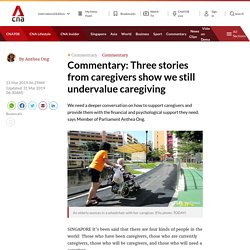
Indeed, I was recently at a corporate event and met a most unlikely caregiver — Siti, a young professional in her twenties who became emotional when sharing her challenges caring for her three unmarried aunts in their 60s — one suffering from diabetes and depression, another from ovarian cancer and the third from kidney failure. Caregiving affects all of us yet this role is, ironically, one of the most undervalued in our society. When carers are burnt out, who cares for them? SINGAPORE: When a loved one becomes a patient at home, it can take a toll on the family, especially the primary carer.
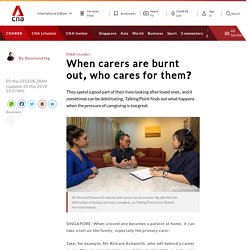
Take, for example, Mr Richard Ashworth, who left behind a career as an office manager to take care of his adoptive father, John, nine years ago. His father, 86, suffers from a host of age-related health issues, including dementia and colon cancer. Not only have these conditions left his elderly life in tatters, they have also taken their toll on his son’s mental health. “I’d get so frustrated — how to handle him when he started screaming?” Recounted the 65-year-old.
“I’d start arguing with him also: ‘Why are you doing this to me? Like anyone caring for a frail or disabled loved one, he experienced fatigue and stress. Prolonged stress is one, as the programme Talking Point examines how severe the burnout can become and how to combat its effects when the pressure of being the primary caregiver of a loved one is too great.
“I can’t just say I can’t be bothered. Overview. Caregiver Financial Stress. Caregiver Mental or Emotional Stress. Caregiver Physical Stress. Overview.
Cognitive Changes. Emotional Strain. Behavioural Changes. Resources for Signs of Caregiver Stress. Overview. Common Signs of Caregiving Burnout. Take this quiz to find out if you are heading for Caregiver Burnout. Caregiving can bring many positives into your life — but it’s also hard work, physically and emotionally.
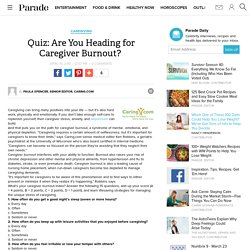
If you don’t take enough self-care to replenish yourself, then caregiver stress, anxiety, and depression can build. And that puts you on the path for caregiver burnout, a syndrome of mental, emotional, and physical depletion. “Caregiving requires a certain amount of selflessness, but it’s important for caregivers to know their limits,” says Caring.com senior medical editor Ken Robbins, a geriatric psychiatrist at the University of Wisconsin who’s also board certified in internal medicine. “Caregivers can become so focused on the person they’re assisting that they neglect their own needs.” Caregiver burnout interferes with your ability to function.
“It’s important for caregivers to be aware of this phenomenon and to find ways to either prevent or minimize it when they realize it’s happening,” Robbins says. What’s your caregiver burnout index? 1. A. B. C. D. 2. 3. A. B. C. D. 4. 5. 6.
Overview. How to prevent caregiver burnout. Resources for Coping with Caregiver Stress. Overview. More support for caregivers to seniors to help them cope with duties and stress, Health News. SINGAPORE - More help is on the way for residents in the South West District who are caregivers to elderly family members.
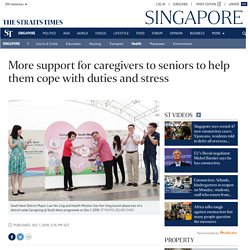
South West District Mayor Low Yen Ling on Saturday (Dec 1) announced three new initiatives by the South West Community Development Council (CDC) to better support caregivers, especially in an ageing society with smaller families. One key initiative is the South West Caregiver Support Fund. Caregivers can receive interim financial assistance of $500 to help them pay for expenses like medical equipment, transport costs for medical appointments, training in caregiving or counselling. It is meant to supplement national schemes that provide more long-term assistance. For a start, a total of $150,000 will be set aside for 300 caregivers in the next three years. The third initiative is a workplace advisory that the South West CDC came up with, together with the Tripartite Alliance for Fair and Progressive Employment Practices and Workforce Singapore.
Caregiver Support. Support for Individuals and Caregivers. Support for Individuals and Caregivers As an individual living with a mental illness, social inclusion plays a central role in recovery. However, the lack of understanding about mental illness, compounded by the negative portrayals of the mentally ill in the media, often adds to the marginalisation of this misunderstood group.
Without acceptance from the community, people with mental illness often face discrimination, lack social support, and find themselves isolated. It is therefore important to build the emotional resilience and find pillars of support at home, at work and in the community. As a caregiver, one may experience various issues and problems in caring for his loved one who has mental illness. Read about Madam Wee's plight when she cared for her 80-year-old husband who had anxiety disorder and depression. The following helplines manned by key partner organisations will help both individuals and caregivers find further assistance in the community. Related article -